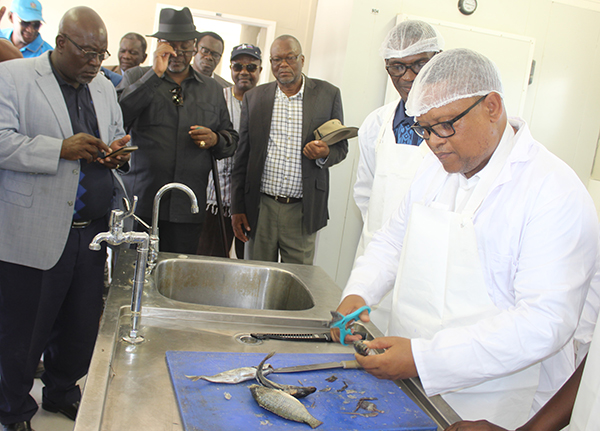Edward Mumbuu
The notorious ‘Esau act’ or Fisheries Marine Resources Act, through which the Fishrot scheme was midwifed, remains unchanged – the lucrative industry is still exposed to potential looters.
This is according to the Institute for Public Policy and Research’s (IPPR’s) report, launched last week, in which government is advised to amend the fisheries law, whose certain parts consolidate unfettered powers over the country’s fisheries and marine resources in the hands of one person – the minister.
The ‘Esau act’, as it has come to be known, refers to clauses inserted in the fisheries law that was allegedly used by former Cabinet ministers Bernhard Esau and Sacky Shanghala and company to enable the theft of the country’s fisheries at an industrial scale.
“The powers given to the minister in the Act have no checks and balances, such as oversight by the Marine Resources Advisory Council (which mainly advises on Total Allowable Catches (TACs), fees and levies) or any other body,” IPPR says.
The 2015 changes gave the minister – Esau in this case – an influential role in deciding on the utilisation of “marine resources to advance any social-economic, cultural or other governmental objectives in the public interest”. In addition, the insertion of Section 39 (3A) gave the minister the power to allocate a quota to the National Fishing Corporation (Fishcor) to achieve the objectives set out in Section 3 (3) at whim.
The minister was also empowered to unilaterally allocate fishing quotas to the holders of fishing rights. What is, however, worrying to IPPR is that the law remains unchanged and could be used to enrich a select few at the majority’s expense.
“Soon after news of the Fishrot scandal broke, the new minister of Fisheries and Marine Resources, Dr Albert Kawana, spoke of reversing the 2015 amendments. However, since then, there has been no news of an amendment bill coming to parliament,” IPPR laments.
It is IPPR’s view that the Fishrot – to a great degree – was enabled by the veil of secrecy in which the fisheries ministry operates. “There are no publicly available lists or registers of the companies that receive rights and quotas or the vessels that are licensed to fish in Namibian waters. There is certainly no attempt to compile and publish anything that resembles a beneficial ownership register for the fishing industry,” reads another portion.
Changes
More so, the policy research entity makes a raft of proposals to unmask the secretive fisheries ministry.
Chiefly, it calls for the urgent opening up of the fisheries sector, including the publication of lists of all rights holders, quota recipients and licence holders, inclusive of beneficial ownership details.
In addition, it called for the urgent amendment of the Marine Resources Act to curtail the minister’s discretionary power and introduce transparency measures.
“The government [should] immediately address the institutional weaknesses in the Ministry of Fisheries and Marine Resources in tandem with the above reform processes to ensure a new level of professionalism and commitment to quality governance is achieved,” IPPR recommended.
Darkness
In no uncertain terms, IPPR placed it on record that where there is no transparency, corruption thrives.
To arrest graft or the perceived maleficence in the fishing sector, which some say operates like a “mafia syndicate”, it must open up for public scrutiny.
The government has also been advised to join the Fisheries Transparency Initiative (FiTI) and adhere to its standards and requirements.
“The government [should] start the implementation of the Access to Information Act immediately, with funds set aside in the 2023/24 budget to set up the necessary structures and staffing complements,” IPPR continued.
The policy institute also called for the implementation of the Whistleblower Protection Act and the Witness Protection Act without delay.
Nobody was spared in the IPPR report, including those currently benefitting from the status quo.
“The private sector [should] commit to supporting fundamental and holistic reforms, including transparency pledges, in the fishing industry, rather than seeking to get what short-term gains they can from a dysfunctional system.
“[The] Civil society and the media [should] ensure they hold the fisheries industry to account and insist on access to information. Donors [should] assist in boosting capacity and expertise within the media and civil society to monitor effectively what can be a complex industry,” IPPR further added.
Fishrot
The Fishrot scandal is a multimillion-dollar scheme that landed two former Cabinet ministers in jail, awaiting trial on a sprawling corruption case, which also led to the arrests of Swapo-aligned businessmen.
They include Esau, Shanghala, cousins James and Tamson Hatuikulipi, Pius Mwatelulo, Mike Nghipunya, Nigel van Wyk and Jason Iyambo as well as Sakaria Kuutondokwa Kokule.
Others fingered in the scandal include lawyer Marén de Klerk and Icelandic executives Ingvar Júlíusson, Egill Helgi Árnason and Adalsteinn Helgason.
They are yet to be extradited to Namibia so they may stand trial alongside their co-accused.
The ruling party has struggled to shrug off the corruption tag, especially after details emerged that successive Swapo campaigns – internal and external – have been bankrolled by illicit monies derived from Fishrot.
“Being the chairperson, I was given the donation [N$5.2 million] by James Hatuikulipi, in his capacity as a businessman. He never came to us with anything else. He just said ‘look, I have got this much; it’s a donation for you guys to do your work’. That is how it came to me. That was not the only donation. We received a lot of other donations,” Swapo’s Oshikoto coordinator and secretary general hopeful Armas Amukwiyu said recently.
“When we receive donations, we don’t ask ‘where did you get the money from’? Therefore, in our conscience, we are not part and parcel of Fishrot because we did not take the money knowing that the money was stolen”.
– emumbuu@nepc.com.na
Caption:



